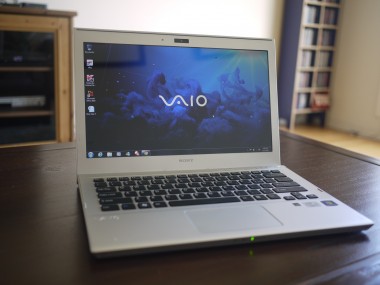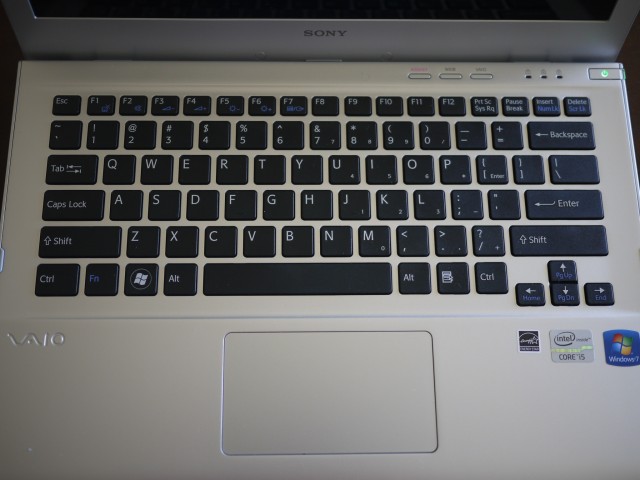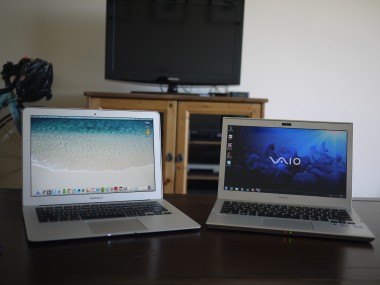If you?re shopping for a new laptop, you might find the term ?Ultrabook? popping up a lot during your research. An Ultrabook is thinner and lighter than a regular laptop, but it doesn?t sacrifice such features as a full keyboard, and it uses a different kind of memory instead of traditional hard drives to offer speed and good battery life, so you can use it as your main computer for everyday tasks like browsing the Web and working on documents. After a trend started by Apple?s MacBook Air, Windows PC makers such as HP, Dell and Samsung offer them, and now Sony has joined the fray.
Over the past week, I?ve been testing the Sony Vaio T13, the company?s first Ultrabook, and what makes it stand out from the pack is its affordable price tag. The cost of Ultrabooks still hovers in the $1,000 range but the Vaio T series starts at $770. By comparison, the similarly featured Dell XPS 13 costs $999 and up, while the 13-inch MacBook Air starts at $1,199.
For the price, the Vaio T13 offers Intel?s latest Ivy Bridge processors, a plethora of ports and four gigabytes of memory. To keep costs down, there are some tradeoffs, such as a lower resolution screen, but overall, I found the Vaio T13 to be a speedy machine. It?s a good value to be sure, but there are some downsides, such as a subpar keyboard and loud fan, that holds it back from excellent.

The Vaio T13 measures 12.7 inches wide, 0.71 inch thick and weighs 3.54 pounds, so it?s heavier than a number of ultrabooks on the market. For example, the Dell XPS 13 is 2.99 pounds and the MacBook Air weighs 2.96 pounds. That said, I didn?t find the extra weight to be a huge problem. I was able to carry it around in my backpack without it weighing me down.
Also, while it?s thicker than the Air, I appreciated the selection of ports available on the Vaio. This includes an Ethernet jack, two USB ports, HDMI and VGA ports if you want to connect to a TV or monitor and a Memory Stick Pro Duo/SD card slot.
The Vaio T has a 13.3-inch display with a 1,366 by 768 pixel resolution. Colors looked a bit dull, and pictures and videos weren?t overly bright or sharp. The lower resolution also means you have to scroll a bit more to see what?s onscreen, but you do get a decent-size touchpad that supports multitouch gestures to help you navigate various pages and switch between tasks. It worked well in my tests as I was able to return to the desktop by swiping down on the touchpad with four fingers and move between Web pages and photos by swiping left or right with three fingers.
But I didn?t like the Ultrabook?s keyboard. There?s plenty of spacing between the keys, so it doesn?t feel cramped. But the buttons are stiff and squishy, so I really had to punch at the keys. It?s something I got used to after a while, but it led to a lot of mistakes and frustration at the beginning. I also wish the keyboard was backlit for easier typing in darker rooms.

The $799 Vaio T13 I reviewed is powered by an Intel Core i5 processor and features a combined 500GB hard drive and 32GB solid-state drive. (You can configure the ultrabook with a faster i7 processor and up to 8GB of memory.) A number of Ultrabooks feature only solid-state drives ? or flash memory ? that improve speed and battery life but limit storage capacity. They are also more expensive, which is why Sony used this hybrid option.
Even so, I found the Vaio T13 to be a responsive computer and you get the bonus of extra storage capacity. It took the Ultrabook 29 seconds to boot up from a cold start and seven seconds to wake up from sleep mode. The MacBook Air started up in 15 seconds and awoke in five seconds, so there isn?t that much of a difference in the latter test.
At one time, I had at least a dozen tabs open in my Web browser, streamed a YouTube video and downloaded an album from the Google Play Web store while working on a Word document. The Vaio T13 was able to handle all those tasks without slowing down. However, its fan does tend to make a lot of noise. It?s annoying, but I suppose it is doing its job, as the Ultrabook never got warm, even when I was viewing entire TV shows on Hulu.

Sony estimates the Vaio T13?s battery life to be around seven hours and 30 minutes with power-saving mode on. In my tests, where I turned off all power-saving features and left Wi-Fi on, set the display to full brightness and looped a music playlist while running an email application in the background, the Vaio delivered four hours and 20 minutes of battery life.
The battery performance is middle-of-the-road compared to some of the other Ultrabooks we?ve tested at AllThingsD, with the Dell XPS 13 being the worst at under four hours and the Lenovo IdeaPad U300s being the best at five hours. With more normal usage, I expect you should get about an additional hour of battery life from the Vaio T13.
The Vaio runs Windows 7 and comes preloaded with a starter edition of Microsoft Office 2010, which offers basic versions of Word and Excel, and a 30-day trial of Kaspersky Internet Security. There are also various Sony apps, such as the company?s Music Unlimited store and PlayMemories multimedia gallery ? all of which you can access from a pull-down menu at the top of the desktop screen.
For those on a budget, the Sony Vaio T13 is certainly worth a consideration. It?s fast and offers a good amount storage. But if possible, I?d definitely recommend going into a store and trying out the keyboard to see if it?s to your liking.
Source: http://allthingsd.com/20120719/sonys-first-ultrabook-targets-the-budget-conscious/
dobie gray bruce springsteen grammy nominations lil boosie new edition austerity rihanna and chris brown back together
No comments:
Post a Comment
Note: Only a member of this blog may post a comment.